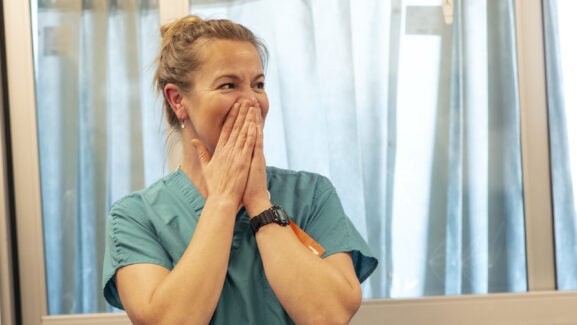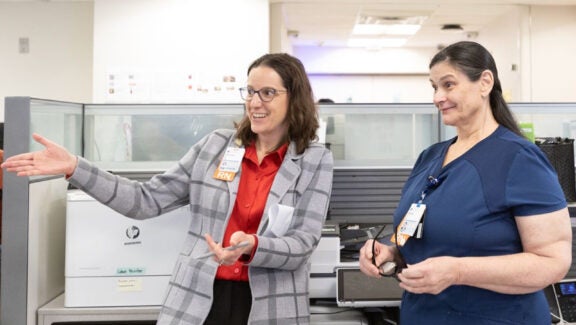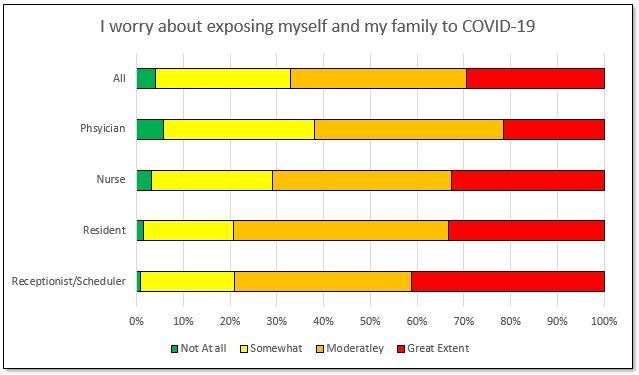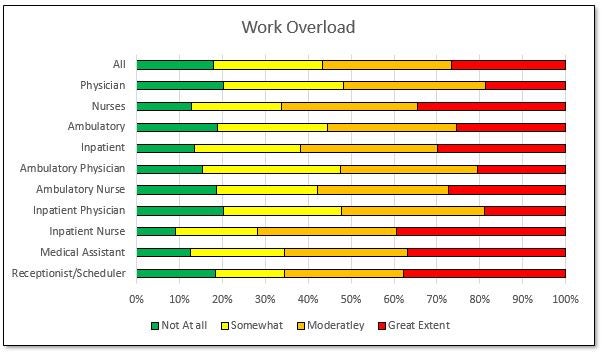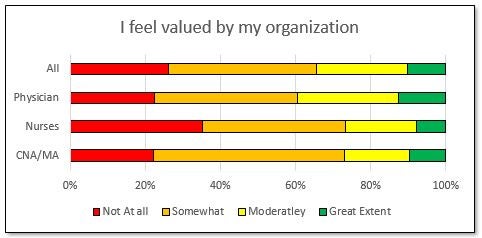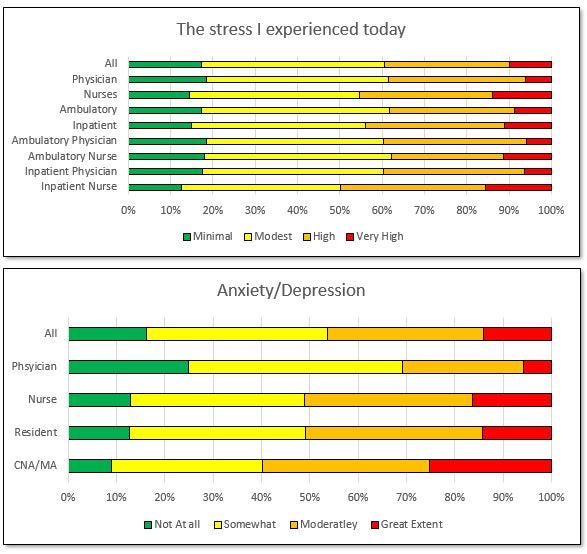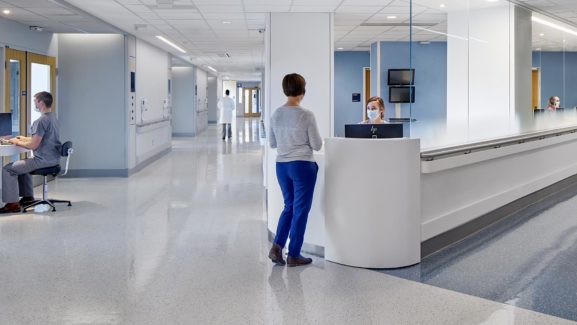

Coping with COVID-19 for Caregivers Survey Follow-up
Dear UVA Health Team Members,
We have had an extraordinarily challenging year, during which no one has escaped the stressors or personal hardships of the pandemic. You have all continued to meet the unprecedented challenges of fighting COVID-19 with steadfast dedication and perseverance, while also managing your daily responsibilities to your families and community during a time of unrest and uncertainty. For that we are immensely grateful.
We want to share with you the results of the American Medical Association (AMA) Coping with COVID-19 for Caregivers Survey that we administered in October and November. This is a tool developed by the AMA to assess the stress impact of COVID-19 caregiving and to be able to identify opportunities for interventions and supportive actions. Over 3,500 of our 13,000 clinical and non-clinical UVA Health team members participated in the survey.
Below this message you will find:
- A summary of survey results
- Actions taken before the survey and those currently underway in response to the results
- Strategies for future support
At the outset of the pandemic, there were high levels of fear: of not being protected and contracting the virus, of bringing it home to family members, of isolation from loved ones and unknowns of epic proportion. We enacted plans for what we thought would be a surge in COVID-19 patients which did not materialize. We subsequently had to revise our approach with continued commitment to team member, patient and community safety, while at the same time addressing operational viability of our services.
Even though much has improved since last year, we know you made many sacrifices to meet the challenges. You endured financial mitigation strategies necessary to sustain our ability to provide outstanding patient care and to continue critical research and education; you have managed increased workloads in order to provide highly complex care with heightened safety precautions; you have continued your duties despite concern for your own and your family’s COVID-19 safety; you have provided compassionate care to patients and their families during this often-heartbreaking time — and much, much more.
Thanks to your incredible efforts, we have:
- Cared for over 1,000 COVID-19 patients at UVA Medical Center — with exemplary outcomes. You have saved many lives.
- Cared for over 850 COVID-19 patients via In Home Monitoring through Population Health
- Developed and implemented new testing procedures that have been adopted by others around the country
- Secured our personal protective equipment supply chain
- Opened units in our new bed tower ahead of schedule to care for COVID-19 patient
- Launched a proactive vaccination campaign.
- Stabilized our financial health to insure our future ability to care for patients
However, we understand that the demands of our current environment have added further stress to an industry and infrastructure that was already under pressure — and we know that these conditions have a very real impact on team member well-being.
As a leadership team, we want you to know that we care about your well-being, and that we are actively pursuing ways that we can better understand and address the stress and impact on our team members. The results you will see below are consistent with other national findings both in this survey and others done by groups assessing the impact of COVID-19 on the healthcare workforce. The priorities are clear: to reduce fear and mitigate avoidable stressors by improving the work environment; to overcome any stigma of asking for mental health help; to assure that safety measures are in place and enforced, and to keep addressing operational issues that improve the workflow and workload.
We know that challenges we face together will persist and evolve, and that we must continue to prioritize team member well-being and to engage openly in this conversation. We encourage all team members to ask questions, to call attention to existing barriers, and to share ideas for improvement with your supervisor, or with any UVA Health leader. In the paragraphs below you will find multiple avenues for support, and for sharing your ideas.
We look forward to working with you toward a brighter, stronger future. Thank you for the valuable work that you do every day to help build our collective unity, strength and hope.
Sincerely,
K. Craig Kent, MD
Executive Vice President for Health Affairs
Bobby Chhabra, MD
President, University Physicians Group
Pam Cipriano, PhD
Dean, School of Nursing
Wendy Horton, PharmD, MBA
Chief Executive Officer, Medical Center
David Wilkes, MD
Dean, School of Medicine
AMA/UVA Coping with COVID-19 for Caregivers Survey: Summary of Results
The AMA results are presented using the stress continuum of green, yellow, orange, and red. More information about the stress continuum is found on the UVA Health Wisdom & Wellbeing Program website.
The model acknowledges that:
- People have a range of reactions to stress
- There will always be some level of work stress
- Understanding team member stress experiences creates opportunities to build resilience and “grow the green”
Overall survey results show that UVA team members reported the following:
- Worry about COVID-19 exposure
- Work overload
- Not feeling valued
- Self-reported increased levels of stress, anxiety and depression
1. Worry about COVID-19: Over 60% of UVA Health respondents reported moderate to great concern about COVID-19 exposure. This mirrors national and global findings.
- Residents and front desk team members reported the greatest level of concern.
2. Work Overload: 55% of UVA Health respondents report experiencing work overload.
- The experience of work overload occurs when work demands exceed the time and energy of team members to address those demands.
- The complexity of care for COVID-19 patients and ensuring safety measures along with changes in workflow have increased workload for many team members.
- Work overload demands are higher in inpatient nursing team members, in medical assistants and schedulers, but are also high in our ambulatory physician and nurse team members.
3. Feeling Valued: Over half of UVA Health respondents reported feeling a moderate to low level of value.
- The extent that team members feel valued by the organization provides insight to general workforce morale.
4. Stress, Anxiety and Depression: Approximately 2/3 of UVA Health respondents reported experiencing stress; with 1/3 entering the orange and red zones (potentially need help). Over 50% of Nurses, Residents and CNA/MA team members reported feelings of anxiety or depression.
(NOTE: Immediate support and counseling is available for any team-member in need: 434-243-2643 (Faculty and Employee Assistance Program).
We Hear You! Actions Underway
1. We are checking in: We’ve been working hard to get out of our offices, onto the floors, to listen and experience what things are like for you.
- We are listening for what’s going well for you so that we can replicate it on other units
- We are listening for ways to reduce unnecessary stressors (what’s not going so well that can be fixed)
- We are listening for the effects of changes we are making (how's it working?)
2. We are working hard to protect your safety:
- PPE Committee with front line members to insure adequate protection of our team member
- Developed on site COVID testing — first in the state to provide readily available testing
- Developed the first COVID clinic in the state to expedite identification of COVID positive team members
- Testing offered to staff in convenient locations and times
- Identified additional space for staff to take safe meal breaks
- Testing for patients being admitted and prior to operative procedures
- Independent assessment of vaccine safety
- Offered and delivered vaccine to all team members rapidly and efficiently
3. Growing the Green and Peer Support — visit the Wisdom & Wellbeing Program website for more information on the following;
- Stress First Aid: Information for your team about how to manage stress at work and help team members with a stress injury.
- Peer Support Program: If you would like a briefing for your unit about peer support.
- Positive Practices: We encourage units and departments to begin using the evidence based positive practices regularly in the workplace to “grow the green” in your work setting.
- Positive communication: Strategies to reduce conflict and enhance team communication.
- Creating a culture of respect and inclusion in the workplace is key to wellbeing. We have a 2 hour workshop to help people step in and speak up when such events occur. To request a Stepping In workshop, contact the CME office at PSL5G@hscmail.mcc.virginia.edu.
4. Expanding access to mental health services
- The Faculty and Employee Assistance Program (FEAP) provides a broad range of confidential stress and coping services to all university employees and their families.
- To help address the specific needs of health system employees, FEAP continues to develop strategies to make mental health services as accessible and convenient as possible.
- Outreach: The FEAP program (Faculty and Employee Assistance Program), in collaboration with the PNSO, has been piloting wellbeing check-ins on some units. Staff are surveyed for interest in having an outreach call from FEAP and thus far, on average, 15% of the team members have been connected with FEAP through this process. Look for extension of these services over the next few months
- Extended hours for health system employees: FEAP will now have regular individual appointments from 8 am to 6 pm. Team members who need a flexible appointment can request an accommodated time; for example, coming off of a night shift and needing an appointment before 8 am.
- FEAP can facilitate access to psychiatric services for health system employees
- We have streamlined coordination of mental health services for health system employees: click here to request FEAP support or call 434-243-2643 to learn more about how to help a team member or yourself.
Latest News

